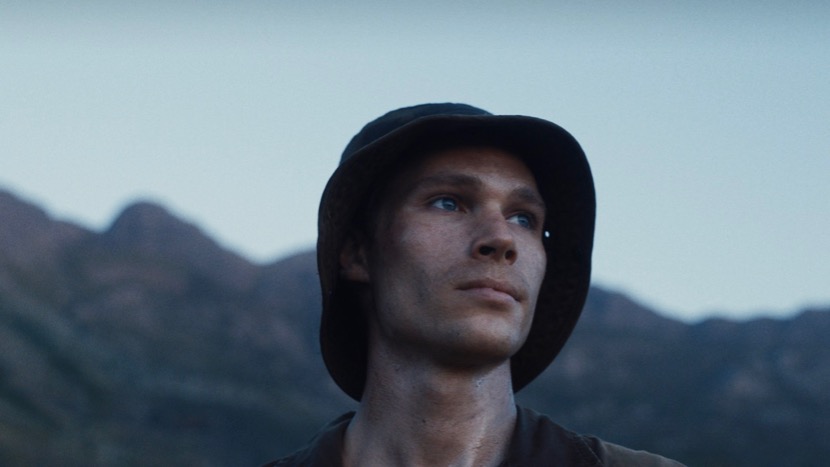It's been almost ten years since 2011's Beauty, that jolting study of obsession that smartly updated Death in Venice and gave the South African writer-director Oliver Hermanus his international breakthrough. That was a contemporary piece, shot from the point of view of a middle-aged man gazing with ever greater intensity at a younger man who was all but a blank screen, a repository for his pursuer's projections. The director's latest Moffie follows not as a corrective per se (Beauty barely put a foot wrong), but a counterpoint: here is a period drama - set in the South Africa of 1981, as initially described in André Carl van der Merwe's autobiographical novel - centred on a young man fighting battles on several fronts simultaneously. The noisiest one is that Nick van der Swart (Kai Luke Brummer) has been conscripted into: apartheid-era SA's underdocumented military action against its Soviet-backed near-neighbours Angola, intended to keep the grave threat of Communism at bay. Others are more discreet, matters of personal identity. Nick's dual heritage and cutglass English-schooled accent mark him as an outsider in the platoon he's yanked into, even before we consider the internal war he's waging with his own sexuality - a conflict hardly becalmed by having to bunk up in close proximity with a dozen or more shirtless, lusty, roughhousing contemporaries. (That affectionate-looking title turns out to be the Afrikaans for "faggot".) The reduced, 1981-sized frame is its own indication that Hermanus is engaged in the manufacture of cinematic pressure cookers, films that subject their characters to the extremes of heat and hormones, put the squeeze on everyone, and watch and wait - as we watch and wait - for an explosion of some kind.
What's notable (and laudable) is how often Hermanus converts those unseen but unmistakably felt pressures into punchy, revealing images. Moffie's first half unfolds much like a sunburnt Full Metal Jacket, as our boy is far from enthusiastically dragged onto the veldt and made subject to the ritual humiliations that pass for Army training. The crucial difference is that Hermanus views the making and breaking of these young men with far greater compassion than the strictly analytical Kubrick. For starters, he tends to view his recruits in close-up rather than at a distance, as faces rather than bodies, which allows him (and us) to better register the pained expressions and tear-stained cheeks of the two boys roughed up in the film's early stages for non-adherence to military norms. Equally, though, Moffie hones in on those genuine moments of camaraderie and brotherhood - like an impromptu singalong to Rodriguez's recently rediscovered cultural touchstone "Sugar Man" - which offer relief and hope amid the relentless, crushing drilling. Out of these moments, Nick establishes a tentative, don't-ask-don't-tell relationship with Dylan (Ryan de Villiers), a fellow recruit with whom he shares an insulating clinch in a trench one chilly night. Yet we never lose sight of the fact these young men are being trained to kill; to turn the abusive instincts they display upon encountering a black commuter on a train station platform outwards against an entire nation. Love is barely in this picture; it seems more likely that these soldiers' inculcated loathing for otherness will wind up being turned against themselves.
Hermanus digs deep into the psychology of van der Merwe's book. It takes a while, but we eventually understand the strange place the shower block occupies in Nick's messed-up thinking, and how it relates to a shame dredged up from childhood; in the meantime, we're bombarded with disturbing flickers of trauma - a sudden suicide, a barrack-room accident - which go unspoken about, seemingly unprocessed even by the narrative, and which have to be repressed along with everything else Nick encounters here. This is a simmering film, violent and volatile-seeming even before it gets to the Angolan scenes; watching it is not unlike being pinned down by sniper fire, which may in turn be analogous to the experience of living in a deeply conservative place and time, a moment where any opportunities for personal growth get all but trampled into the ground by a more pressing need to survive. (It's not an inapt release for April 2020.) That leaves Moffie a tougher sit than Beauty, which in some ways could be packaged as a thriller and observed from safe distance. The closeness Hermanus keeps to his characters erases that distance: there are stretches where he deviates from the Kubrick model and into the horribly compelling, experiential territory of a Casualties of War or Come and See. The control is such that even when you flinch or look away, something in the sound design - a wheezing man's final breaths, say - puts you right back in Nick's boots, and Hermanus finally denies us the catharsis we may be looking (even praying) for: van der Merwe's point, honourably translated to the screen, was that South Africa was engaged in a long march towards the kind of freedoms you and I now take for granted. Much to admire, however, not least the casting of the upright, acutely alert Brummer in the lead, demonstrating a civility and sensitivity that could just be this kid (and this land)'s salvation, if any of it can possibly escape unscathed.
Moffie is available to stream via Curzon Home Cinema from tomorrow.

No comments:
Post a Comment